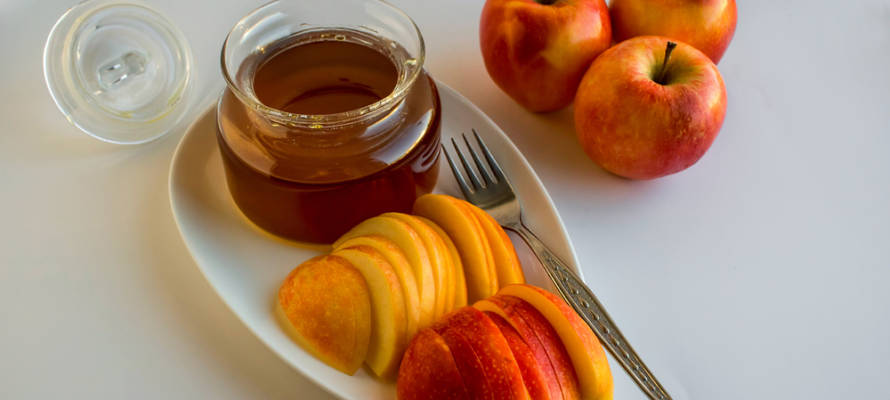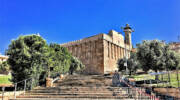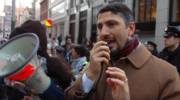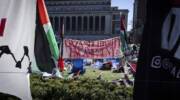It is customary for Jews to eat symbolic foods on the Jewish New Year, such as apples and honey. However, the reasoning behind it might not be what you think!
By: Rabbi Ari Enkin, Rabbinic Director, United with Israel
Here are 10 facts about Rosh Hashana that describe some of the symbolic foods and the reasoning behind them, including apples and honey.
Did You Know:
1. Although universal Jewish custom is to EAT symbolic foods on Rosh Hashana, according to one version of the relevant Talmudic passage,it suffices to merely GAZE at the symbolic foods in order to arouse their “powers.” As such, one who doesn’t enjoy one or more of the symbolic foods should still bring them to the table on Rosh Hashana, look at them, and then recite the appropriate prayer.
2. Although there a currently DOZENS of symbolic foods that are eaten on Rosh Hashana by Jews of various communities (go to a Moroccan Jewish home for the Rosh Hashana evening meal and you won’t even have room for the meal after your done tasting all the symbolic foods!) the Talmud only lists 5 symbolic foods: “Kara” translated as gourds (i.e. pumpkin and other thick fleshed vegetables), “karti” translated as leeks, “silka” translated as “beets” and “tamri” dates, and “rubia” translated as…well no one really knows what rubia truly is, but common custom is to use black eye peas, sesame seeds or fenugreek for “rubia.”
3. There are two “competing” reasons why we eat symbolic foods on Rosh Hashana. According to one opinion, it is because these sorts of foods reproduce quickly and/or have a sweet taste, which symbolizes our wishes that the Jewish people become numerous and that we be blessed with a sweet year. According to another opinion, we eat these symbolic foods because their name “hints” to some type of blessing. For example, the word “karti” also means to “cut off” or “destroy”. Hence we eat “karti” in order to symbolize our hope that our enemies be destroyed. So too, “rubia” also means “to increase”. Hence we eat rubia so that our merits and mitzvot increase.
4. According to the second explanation for the eating of symbolic foods just mentioned, one should eat any and all foods whose name even remotely refers to some kind of blessing in any language. For example, some people eat raisins and celery on Rosh Hashana in order to symbolize their hope for a “raise-in-salary!”
5. Although eating an apple dipped in honey is elementary Rosh Hashana knowledge, it only arrived to the Rosh Hashana table many years after the Talmud was completed.
6. So why do we eat apples on Rosh Hashana? According to one opinion, it is simply because the Ashkenazi Jews of Europe couldn’t get a hold of any other of the other symbolic foods for Rosh Hashana so they had to make due with an apple, which is sweet. (For this reason, be sure to use only red apples on Rosh Hashana, not green ones which are a little sour). According to another opinion, it is because when Jacob went to Isaac to receive his blessing, Isaac remarked “…the smell of my son is like the smell of a field that God has blessed.” Our sages say that this smell refers to an apple orchard. So too, we are told that this event, of Isaac blessing Jacob, took piece on Rosh Hashana.
7. Although the source of eating symbolic food is attributed to the Talmud, it may very well be that the origins of the custom to eat symbolic foods on Rosh Hashana are from the biblical era when Ezra and Nehemiah told the Jewish people one Rosh Hashana “Go and eat fatty foods and drink sweet drinks.”
8. We use honey as the sweet item to dip the apple into, rather than any other sweet item (such as sugar), because honey has the same gematria, numerical value, as “Merciful Father.” So too, it reminds us that the land of Israel that is praised as “flowing with honey”
9. While we are told to eat the symbolic foods “at the beginning of the year,” there is much discussion as to what exactly is defined as “the beginning of the year” As such, in some communities the symbolic foods are eaten only at the first, evening meal, of Rosh Hashana, while in other families it is eaten at both evening meals of Rosh Hashana. Yet in other communities the symbolic foods are eaten at all Rosh Hashana meals. There is even a widespread custom to continue to eat the symbolic foods – at least the bread dipped in honey—until the end of Sukkot
10. There is a view that eating symbolic foods on Rosh Hashana in order to arouse blessings and a good new year is a form of witchcraft and divination and is forbidden! Most sources, however, justify this ancient tradition by explaining that it is not the food that has the power to arouse blessing for us, but rather, it is our being moved to pray to God for these blessings upon seeing the foods that is the source of blessings.

Do You Love Israel? Make a Donation - Show Your Support!
Donate to vital charities that help protect Israeli citizens and inspire millions around the world to support Israel too!
Now more than ever, Israel needs your help to fight and win the war -- including on the battlefield of public opinion.
Antisemitism, anti-Israel bias and boycotts are out of control. Israel's enemies are inciting terror and violence against innocent Israelis and Jews around the world. Help us fight back!























